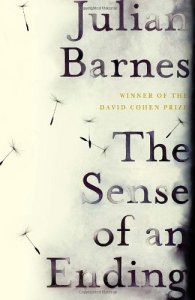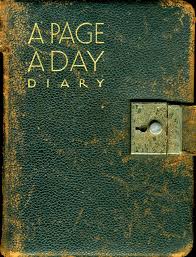 I was asked by a close family member to read Julian Barnes’ The Sense of an Ending. It was an irresistible request; she wanted to be able to talk about the book with someone. She had lingering questions. And so, she lent me her copy.
I was asked by a close family member to read Julian Barnes’ The Sense of an Ending. It was an irresistible request; she wanted to be able to talk about the book with someone. She had lingering questions. And so, she lent me her copy.
I was eager to read the short novel because I’m an admirer of Barnes, even though so far, I had only read his 2005 novel, Arthur and George, a fascinating piece of fiction based on the lives of Arthur Conan Doyle and his historical connection to George Edalji (take a look! I recommend it highly!).
At barely one hundred and fifty pages, The Sense of an Ending is a short read and an agreeable one. But it requires attention. Without a stray or superfluous word throughout, Barnes’ 2011 Man Booker Prize winner draws the reader into a taught and challenging story.
Tony Webster, the protagonist, a child of reasonably affluent parents in London, England, in the sixties and early seventies, might, in another generation, have been considered a Caspar Milquetoast. Might, but perhaps not, because we only have his word for…everything which comes to pass, or is said to have come to pass in this thoughtful and disturbing tale. Because The Sense of an Ending is a reminiscence.
On the stage which Barnes has set, a small number of characters enact a drama that spans forty years, in which one life is lost in youth, one in older age, and in which some are squandered, in the sense that they go largely unlived. Or so the novel makes it seem. Or so Tony makes it seem, because the novel is his subjective retelling of specific events, linked in time by Tony himself, and involving specific people. A handful really. Far too few to chronicle a man’s passage from youth to retirement age.
one in older age, and in which some are squandered, in the sense that they go largely unlived. Or so the novel makes it seem. Or so Tony makes it seem, because the novel is his subjective retelling of specific events, linked in time by Tony himself, and involving specific people. A handful really. Far too few to chronicle a man’s passage from youth to retirement age.
Briefly at the beginning of the novel, Tony introduces us to his sixth form classmates, Alex and Colin―who, not surprisingly, are “book hungry and sex hungry”―and then to newcomer Adrian Finn, who stands out because he is brilliant, intellectual, well read, remote and terribly earnest.
This first part of the novel brings the reader inside Tony’s most vivid and coherent memories. With mordant wit and precise prose, Tony’s world and that of his classmates makes sense:
“Back then, things were plainer: less money, no electronic devices, little fashion tyranny, no girlfriends. There was nothing to distract us from our human and filial duty which was to study, pass exams, use those qualifications to find a job, and then put together a way of life unthreateningly fuller than that of our parents, who would approve, while privately comparing it to their own earlier lives, which had been simpler, and therefore superior.”
After graduation, the boys move on to university. Alex and Colin gradually fade out of the narrative, as Tony finds a girlfriend, Veronica Ford, who is more posh than he. Veronica is all clipped sentences and edges, and it is never clear to the reader what draws Tony to her, probably because Tony himself never knew. In his remembering, Tony offers only a single instance of shared joy between the two: an unguarded moment of dancing that floats up to the surface of Tony’s memory and feels more like loss than pleasure.
During one largely unhappy weekend, Veronica brings Tony home to meet her cool and cryptic mother, her alcoholic father and her stereotypically snobbish and irritating brother Jack. Underneath the veneer of civility, there is a detached cruelty to all of the Fords, and Tony feels himself its target.
During this period, Veronica is also introduced to Adrian Finn.
In the next part of the book, Tony’s reminiscing speeds up, with only specific events to act as signposts along the way: Veronica leaves Tony and appears to fall for Adrian. Adrian commits suicide by hanging himself not long after. Tony and his friends ingest the news and are said to have moved on.
The years go by. Tony marries Margaret and has a daughter. Tony and Margaret divorce. Tony retires, keeping himself mildly busy in his quiet, solitary life, seeing his daughter every now and then, remaining friendly with Margaret, living a life left largely unexamined.
Though it is his own life that he is recalling, the Tony who narrates this part of the novel is a passive and frequently impassive observer of events. He’s a bit of an odd duck.
 And then something happens. He is notified by the solicitor handling the Ford estate that Veronica’s mother has died, bequeathing 500 £ and Adrian’s diary to him.
And then something happens. He is notified by the solicitor handling the Ford estate that Veronica’s mother has died, bequeathing 500 £ and Adrian’s diary to him.
Why on earth would Sarah Ford leave such a strange sum (neither large enough to be of real use nor small enough to be symbolic or ironic), and how did she come to have Adrian’s diary?
Suddenly, Tony’s narrative of remembering, which has been largely unfocused and self-indulgently subjective and navel-gazing becomes more engaged as he reconnects with the present by foraging through the past for clues and hopefully, answers.
The money means nothing to him but when he learns that the diary is in Veronica’s possession, and that she refuses to give it up, he is forced to set the course of his life in reverse, going back in time in search of the clues and the memories that will provide him the answers he suddenly wants.
Without spoiling the story for you, I can say that Tony receives a single page from the diary, and later, a letter from Veronica, though she is not its author. This letter sets off a chain of events and of remembering which will change nothing and no one except…Tony himself. The rest of its damage has already been done. I can say that the letter causes Tony (and the reader), to doubt what he knew or thought he knew and remembered about his past. That it leaves Tony feeling exposed.
As he says:
“You get towards the end of life – no, not life itself, but of something else: the end of any likelihood of change in that life. You are allowed a long moment of pause, time enough to ask the question: what else have I done wrong?”
 In many ways, the moment of revelation in the story is anticlimactic, because it isn’t nearly as affecting as Barnes’ deeper meditation on the ways time and memory alter our sense of ourselves.
In many ways, the moment of revelation in the story is anticlimactic, because it isn’t nearly as affecting as Barnes’ deeper meditation on the ways time and memory alter our sense of ourselves.
It occurred to me many times while reading the book that if any of us were to be judged on the basis of our worst days or our worst moments, then many of us would be guilty of far worse transgressions than the action that fills Tony with remorse.
This is especially true of late adolescence and early adulthood, as Tony himself acknowledges:
“The next day, when I was sober, I thought again about the three of us, and about time’s many paradoxes. For instance: that when we are young and sensitive, we are also at our most hurtful; whereas when the blood begins to slow, when we feel less sharply, when we are more armoured and have learnt how to bear hurt, we tread more carefully.”
The Sense of an Ending is told by a narrator who is unreliable because he is human. What is surprising, then, is not that he has forgotten or omitted moments and life events from his memory, but that one of these omissions carries a heavy emotional charge. Remorse, however, is an enduring emotional creature. Its etymology means to bite a second time and thus to feel the bite a second time. Tony’s fate is to experience what in Judeo-Christian terminology could be called a personal, purgatorial passage: the weight of accumulation and responsibility.
On the matter of memory and emotion, Tony’s own words contradict the facts of the story he’s telling:
“But I’ve been turning over in my mind the question of nostalgia, and whether I suffer from it. I certainly don’t get soggy at the memory of some childhood knickknack; nor do I want to deceive myself sentimentally about something that wasn’t even true at the time—love of the old school, and so on. But if nostalgia means the powerful recollection of strong emotions—and a regret that such feelings are no longer present in our lives—then I plead guilty.”
In a novel in which there are no endearing characters, and in which the narrator allows us at best a selective and oblique view of reality, it’s astonishing that we are so easily able to recognize ourselves, and that this gives us pause.
“For most of us, the first experience of love, even if it doesn’t work out―perhaps especially when it doesn’t work out―promises that here is the thing that validates, that vindicates life.”
Tony, from The Sense of an Ending



Since I could not get out to Pointe Claire to borrow the book, I found it in a used book place, Welch’s, on St-Viateur in my neighborhood. Thanks for the tip. I will check in after I’ve read it.
It’s been a while, David. I’ll look forward to your comments!
This novel, though short, gets under your skin and demands your attention. I had to go back and re read the ending and then have a couple of friends read it too. It makes you question and really think about what you’ve just read. An amazing read
Thanks so much for your comment, Mary, and welcome to the Online Book Club!
Is there anything in my blog post that you disagree with or see differently?
There are things I didn’t mention (the portrait Tony draws of Adrian which cannot be quite accurate; Adrian’s unusual philosophical mathematics in the diary page, for instance).
Were there elements of the story that you found puzzling? Was there a character who elicited empathy or sympathy in you?
If you or your friends have anything to add, you know where to come and share your views!
Thanks again. xo
I thought that this was one of the most original novels that I have read in a long time. It was’t so much due to its subject matter, but because of the way it made me feel. I couldn’t stop thinking about it once I had finished; I read it quite some time ago and I still think about it. For some reason, I feel like I desperately need to make sense of the events that took place between the main characters. Why? I can’t say that I particularly liked any of them. In fact, you could say that I hated the main two (Tony and Veronica). But I definitely empathized with Tony in certain instances. He felt real to me. Human. I suppose that’s why this book pulls you in.
I think the discussion that happens early on in the book between Tony’s teacher and the class sets up the whole book. They talk about what history is and Adrian replies:
‘”History is that certainty produced at the point where the imperfections of memory meet the inadequacies of documentation.” (quoting Patrick Lagrange)”
So really this whole novel is Tony exploring/documenting his own history and you see that he struggles with this.
“We live in time, it bounds us and defines us, and time is supposed to measure history, isn’t it? But if we can’t understand time, can’t grasp its mysteries of pace and progress, what chance do we have with history – even our own small, personal, largely undocumented piece of it?”
Just based on this, it feels almost ridiculous to guess at what really happened or why. If the main character is so unreliable and basically admits to being unreliable, then what chance do we have as readers?
Despite this I am still interested in what other people think about Adrian’s suicide, Veronica’s frustrating mantra of “You just don’t get it and you never will!”(my guess is that she was in love with Tony and he never realized), why Veronica’s mother left the money and the journal to Tony, and why Veronica only gave Tony one page from the journal. I’m probably forgetting something, but these are the main questions that I still have floating around my mind.
Dear Anne,
What a thoughtful comment!
It’s certain to pique Online Book Club readers’ curiosity even more and set off a bunch more discussions among them. 🙂
Yes, I completely agree with you that everything that follows is set up by that definition of history that you quote from the first part of the book:
‘”History is that certainty produced at the point where the imperfections of memory meet the inadequacies of documentation.”
And if it is the logic behind Tony’s quest, then it dooms him from the start.
When I read it (several times!) I found it striking. It’s the use of the word CERTAINTY that is the crux of it, I think.
I loved it but discarded it as I read, because I think that it is more wry wit than it is philosophy, and because I believe that there is no certainty in this life, only truth.
In my blog post, I paraphrase Socrates, to whom is attributed the following:
“The unexamined life is not worth living.”
To me, this is more where Tony has gone wrong. There are rare people among us who are blessed (cursed?) with eidetic memory, but even perfect recollection pales in importance next to inhabiting the moments of our lives as they are lived, next to mindfulness and to being able to interpret their meaning as we live them.
I think that what happens to Tony (the rest of the characters will always remain unkown to us, really) is that after having missed the deeper meanings and truths of the moments of his life as he lived them, he finally arrives at that point (I believe that it’s never too late) when their meaning to him begins to emerge: he is doing his own historical revision.
Tony says:
“But time…how time first grounds us and then confounds us. We thought we were being mature when we were only being safe. We imagined we were being responsible but we were only being cowardly. What we called realism turned out to be a way of avoiding things rather than facing them. Time…give us enough time and our best-supported decisions will seem wobbly, our certainties whimsical.”
What causes Tony sadness is the insight that comes from his revision of his own life story.
Mindfulness. Inhabiting moments. Examining one’s life. To me, that’s wisdom.
The novel ends with Tony a sadder person, but only because he has allowed himself to feel the truth, HIS truth.
I think that in the end, it’s all we have, and I think that it’s enough.
Thanks again Anne!